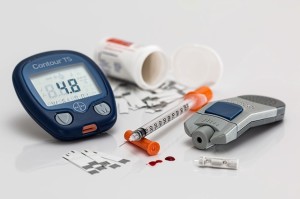DIABETIC AWARENESS
 November is Diabetes Awareness Month and we would like to talk about how this disease can affect your eyes. Diabetic eye disease is comprised of a group of eye conditions that affect people with diabetes. These conditions include diabetic retinopathy, cataracts, glaucoma, and diabetic macular edema or DME.
November is Diabetes Awareness Month and we would like to talk about how this disease can affect your eyes. Diabetic eye disease is comprised of a group of eye conditions that affect people with diabetes. These conditions include diabetic retinopathy, cataracts, glaucoma, and diabetic macular edema or DME.
If you or a loved one suffer from diabetes, it is important to maintain annual eye exams to help prevent vision loss. It is even more important for those who suffer from diabetes to take their medication as prescribed, stay physically active and maintain a healthy diet. This will help to delay or even prevent vision loss from diabetes.
Diabetics should be aware of a few eye diseases that can affect people with diabetes.
- Diabetic retinopathy. Diabetic retinopathy affects blood vessels in the retina which lines the back of the eye. It is one of the most common causes of vision loss among people with diabetes.
- Diabetic macular edema or DME. This is an accumulation of fluid due to leaking blood vessels in the macula – part of the retina that controls our most detailed vision abilities.
Diabetic eye disease can also include cataracts and glaucoma. While these are not limited to individuals who have diabetes, it is more common for diabetics.
- Cataracts. This is a clouding of the eye’s lens. Adults who have diabetes are 2-5 times more likely to develop cataracts at an earlier age than those without diabetes.
- Glaucoma. For adults, having diabetes doubles the risk of glaucoma. This occurs when the optic nerve that connects your eyes to you brain is damaged.
Of all the diseases that diabetic eye disease is comprised of, a cataract is the only one that is reversible. A simple surgery can remove the cataract from the eye allowing for clear, normal vision. With all of the other diseases, once the damage is done there is no reversing it.
There is good news! Early detection and treatment can help to reduce the risk of blindness. Early detection is key to preventing damage to the eye that is irreversible. If you are diabetic let your optometrist know and be sure to maintain your annual visits and exams.
About the author: John D. Bissell, owner of Bissell Eye Care and Tri-State Low Vision Services, offers comprehensive eye examinations for the entire family, ocular disease detection and treatment, eye glasses, sun glasses, active wear, contact lenses, and low vision examinations for those with significant vision loss. He has undergone specialized training for treatment of low vision by the International Academy of Low Vision Specialists utilizing customized telescopic eyeglasses, prisms and telescopic implants for patients who qualify. The practice accepts most types of vision and health insurance plans.
